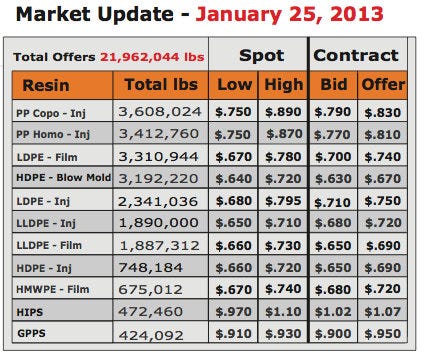TPE resin prices, Jan. 21-25: Spot prices mixed; January contracts closing higher: PE adds $0.04/lb, PP soars $0.15/lb
Spot resin trading was brisk, offers flowed at an elevated rate and prices were mixed, according to spot-trading platform, The Plastics Exchange (TPE). Rising monomer costs are supporting producers' January price increase efforts and sending contract prices higher in January. However, TPE reports that spot resin prices have been unable to keep up, as demand languishes and supplies grow.
January 29, 2013
Spot resin trading was brisk, offers flowed at an elevated rate and prices were mixed, according to spot-trading platform, The Plastics Exchange (TPE). Rising monomer costs are supporting producers' January price increase efforts and sending contract prices higher in January. However, TPE reports that spot resin prices have been unable to keep up, as demand languishes and supplies grow. "Traders are very leery at this lofty level and although this rally has legs, few are willing to buy material without a customer order behind it," explained TPE CEO Michael Greenberg. Export shipments are strong, but mostly from prior sales.
TPE resin prices, Jan. 25, 2013
Energy prices were mildly lower in less volatile trading. March crude oil futures retreated slightly from four month highs, sliding just $0.14/bbl to end the week at $95.88/bbl. Natural gas broke its two-week winning streak, as the March contract gave back just more than a dime to settle Friday at $3.463/mmBtu. The crude oil: natural gas ratio expanded a tad to 27.7:1. Relatively cheap natural gas continues to provide petrochemical companies with a much favored feedstock cost advantage versus international counterparts that derive their feedstocks from the more expensive crude oil chain.
Ethylene spot trading remained active, but off the rampant pace seen earlier in the month. One cracker returned to production, while three others remain offline. Ethylene for January and February delivery traded up towards $0.68/lb, gaining of almost $0.02/lb. The backwardated shape of the forward curve has steepened, recognizing that near-term supply constraints due to the fairly heavy cracker turnaround season will eventually end. Ethylene prices start to slide aggressively beginning in June lasting through the rest of 2013, a discount of $0.11/lb is eventually achieved. Despite scheduled maintenance through May, some question whether the recent sharp and swift increases might lead to an earlier demand-induced break. Ethane lost about a half a cent to $0.245/gal ($0.103/lb).
Polyethylene's (PE) spot market was firm, as some grades held steady while others saw gains. Generic Prime film grades are fairly well supplied out of Houston, offgrade railcar availability is also good and trailing at a decent discount. However, HDPE injection grades are very scarce, and spot material is developing a relatively wide premium to blowmolding. As the month enters its final stretch, no producers appear to be offering discounted spot Generic Prime resin and the January $0.05/lb price increase is deemed solid. This coming week, suppliers will begin prepping buyers for the $0.04/lb increase nominated for February.
Propylene saw "another week, another rally," according to Greenberg. There were just a few polymer grade propylene (PGP) transactions, but it was enough to send this tightly supplied market still higher. PGP for January delivery added a couple cents eclipsing $0.76/lb, while monomer for February changed hands at the premium price of $0.775/lb. The strong spot market, trading several cents above the January contract price of $0.73/lb, has encouraged producers to nominate a $0.07/lb increase for February. The propylene forward curve is flat for the next few months and then takes on a backwardated shape, with the discount reaching about $0.08/lb by December, the same place it was last week.
Polypropylene (PP) has hardly digested the $0.15/lb January increase but needs to brace for another hike in February. Scarce and expensive Propylene monomer is poised to push Polypropylene contracts higher in February - a nomination of $0.07/lb has just been issued. Unplanned cracker outages, ahead of those scheduled during the first part of 2013, further restricted monomer supplies and did not provide resin market participants ample opportunity to secure high volumes of "buy ahead" inventory. As such, "buyers have little ammo to resist the increases", Greenberg said. The cost-push price increase has hit demand, and buyers are procuring only what they need, creating a wide range of prices. Contract purchases can run into the mid-upper $0.80s/lb (and headed into the $0.90s/lb in February), while the low end of the market, certain lots of offgrade Random Copolymer, can still be bought in the mid $0.70s/lb.
Final thought from Michael Greenberg
It is like Déjà vu all over again! The current resin market is starting to look a lot like last year, pulled forward one month, both scenarios driven by a heavy cracker turnaround season coupled with unexpected outages. During the first quarter of 2012 PP contracts increased $0.215/lb - they are already up $0.15/lb this month and there is $0.07/lb on the table for Feb. PE contracts increased $0.06/lb during first quarter 2012 - they are up $0.05/lb this month and there is $0.04/lb nominated for February. It does not look so promising for resin buyers, but if history continues to repeat itself, there will be an even bigger slide on the backend during the second quarter. Last year the break didn't begin until May; unfortunately, in the meantime there will be more pain to endure.
About the Author(s)
You May Also Like


